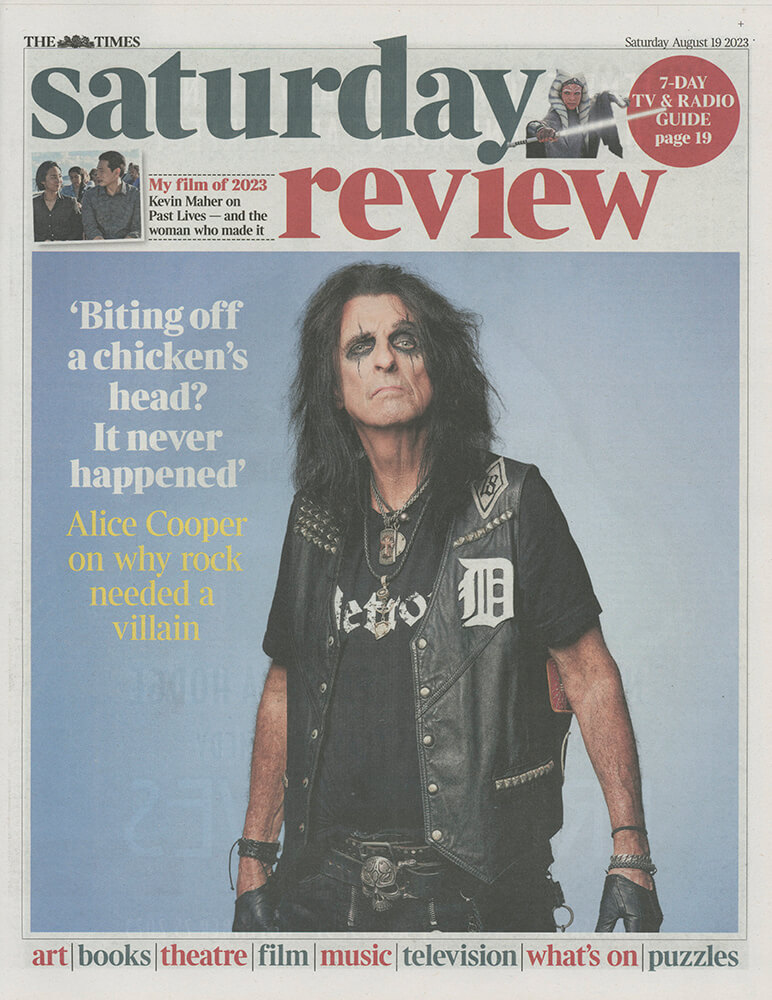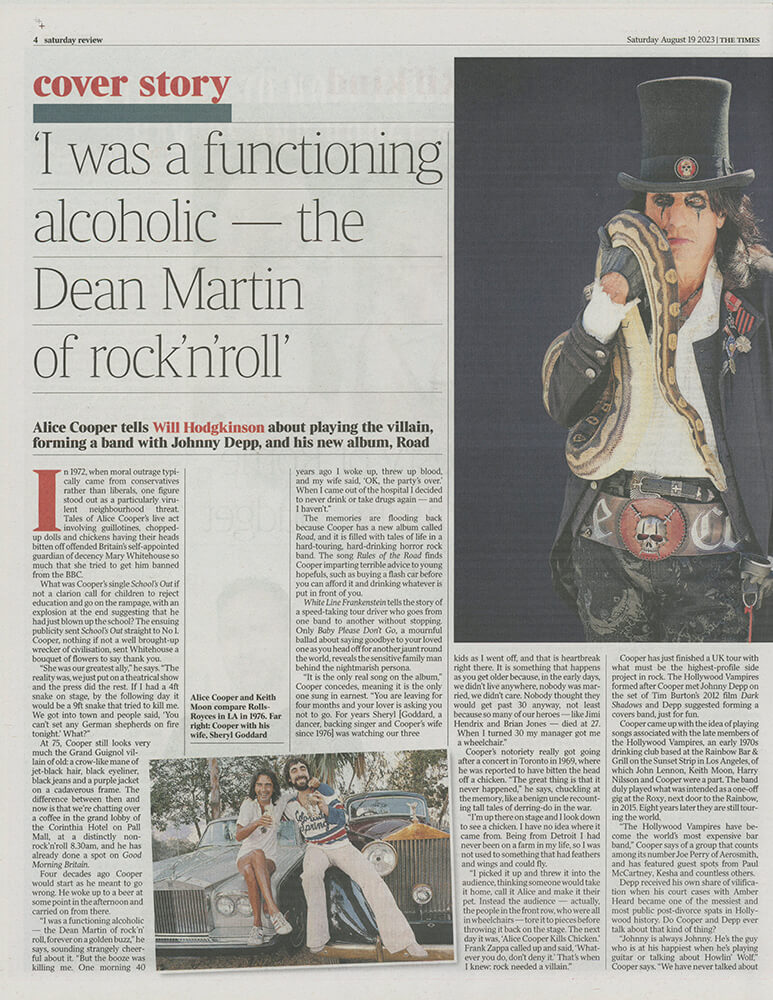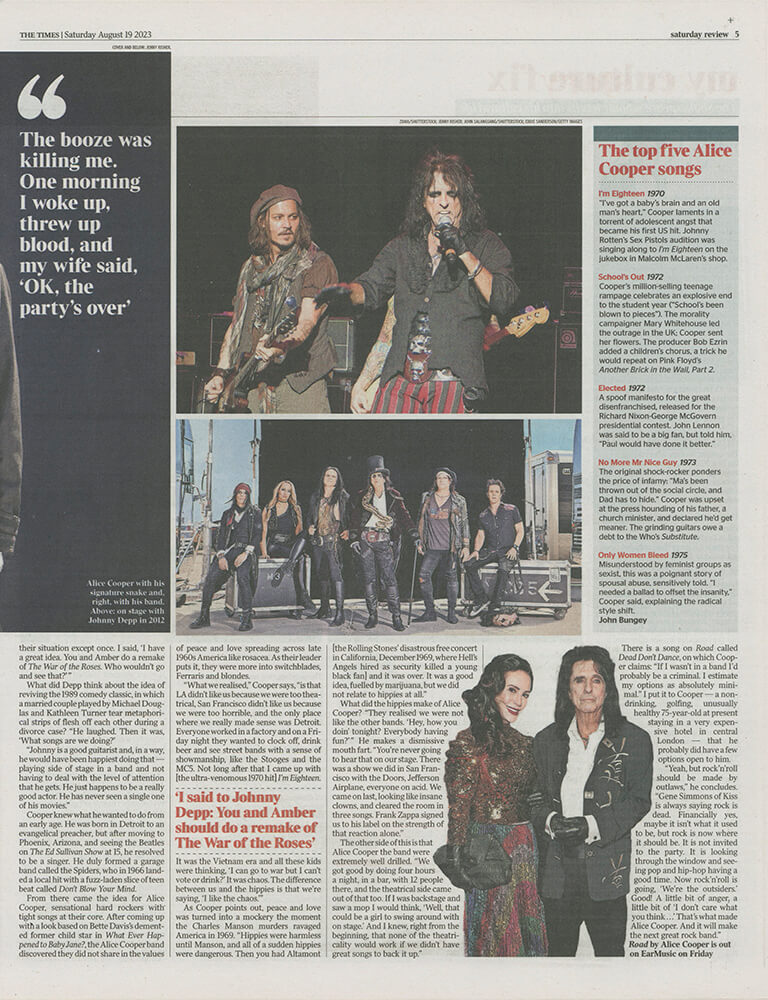Article Database

Times
August 19, 2023
"I Was a Functioning Alcoholic — the Dean Martin of Rock'n'roll"
Alice Cooper tells Will Hodgkinson about playing the villain, forming a band with Johnny Depp, and his new album, Road.
Author: Will Hodgkinson
In 1972, when moral outrage typically came from conservatives rather than liberals, one figure stood out as a particularly virulent neighbourhood threat. Tales of Alice Cooper's live act involving guillotines, chopped up dolls and chickens having their heads bitten off offended Britain's self-appointed guardian of decency Mary Whitehouse so much that she tried to get him banned from the BBC.
What was Cooper's single School's Out if not a clarion call for children to reject education and go on the rampage, with an explosion at the end suggesting that he had just blown up the school? The ensuing publicity sent School's Out straight to No 1. Cooper, nothing if not a well brought-up wrecker of civilisation, sent Whitehouse a bouquet of flowers to say thank you.
"She was our greatest ally," he says. "The reality was, we just put on a theatrical show and the press did the rest. If I had a 4ft snake on stage, by the following day it would be a 9ft snake that tried to kill me. We got into town and people said, 'You can't set any German shepherds on fire tonight: What?"
At 75, Cooper still looks very much the Grand Guignol villain of old: a crow-like mane of jet-black hair, black eyeliner, black jeans and a purple jacket on a cadaverous frame. The difference between then and now is that we're chatting over a coffee in the grand lobby of the Corinthia Hotel on Pall Mall, at a distinctly non rock'n'roll 8.30am, and he has already done a spot on Good Morning Britain.
Four decades ago Cooper would start as he meant to go wrong. He woke up to a beer at some point in the afternoon and carried on from there.
"I was a functioning alcoholic — the Dean Martin of rock'n' roll, forever on a golden buzz," he says, sounding strangely cheerful about it. "But the booze was killing me. One morning 40 years ago I woke up, threw up blood, and my wife said, 'OK, the party's over.' When I came out of the hospital I decided to never drink or take drugs again — and I haven't."
The memories are flooding back because Cooper has a new album called Road, and it is filled with tales of life in a hard-touring, hard-drinking horror rock band. The song Rules of the Road finds Cooper imparting terrible advice to young hopefuls, such as buying a flash car before you can afford it and drinking whatever is put in front of you.
White Line Frankenstein tells the story of a speed-taking tour driver who goes from one band to another without stopping. Only Baby Please Don't Go, a mournful ballad about saying goodbye to your loved one as you head off for another jaunt round the world, reveals the sensitive family man behind the nightmarish persona.
"It is the only real song on the album," Cooper concedes, meaning it is the only one sung in earnest. "You are leaving for four months and your lover is asking you not to go. For years Sheryl [Goddard, a dancer, backing singer and Cooper's wife since 1976] was watching our three kids as I went off, and that is heartbreak right there. It is something that happens as you get older because, in the early days, we didn't live anywhere, nobody was married, we didn't care. Nobody thought they would get past 30 anyway, not least because so many of our heroes — like Jimi Hendrix and Brian Jones — died at 27. When I turned 30 my manager got me a wheelchair."
Cooper's notoriety really got going after a concert in Toronto in 1969, where he was reported to have bitten the head off a chicken. "The great thing is that it never happened,' he says, chuckling at the memory, like a benign uncle recounting tall tales of derring-do in the war.
"I'm up there on stage and I look down to see a chicken. I have no idea where it came from. Being from Detroit I had never been on a farm in my life, so I was not used to something that had feathers and wings and could fly.
"I picked it up and threw it into the audience, thinking someone would take it home, call it Alice and make it their pet. Instead the audience — actually, the people in the front row, who were all in wheelchairs — tore it to pieces before throwing it back on the stage. The next day it was, 'Alice Cooper Kills Chicken.' Frank Zappa called up and said, 'Whatever you do, don't deny it.' That's when I knew: rock needed a villain."
Cooper has just finished a UK tour with what must be the highest-profile side project in rock. The Hollywood Vampires formed after Cooper met Johnny Depp on the set of Tim Burton's 2012 film Dark Shadows and Depp suggested forming a covers band, just for fun.
Cooper came up with the idea of playing songs associated with the late members of the Hollywood Vampires, an early 1970s drinking club based at the Rainbow Bar & Grill on the Sunset Strip in Los Angeles, of which John Lennon, Keith Moon, Harry Nilsson and Cooper were a part. The band duly played what was intended as a one-off gig at the Roxy, next door to the Rainbow, in 2015. Eight years later they are still touring the world.
"The Hollywood Vampires have become the world's most expensive bar band," Cooper says of a group that counts among its number Joe Perry of Aerosmith, and has featured guest spots from Paul McCartney, Kesha and countless others.
Depp received his own share of vilification when his court cases with Amber Heard became one of the messiest and most public post-divorce spats in Hollywood history. Do Cooper and Depp ever talk about that kind of thing?
"Johnny is always Johnny. He's the guy who is at his happiest when he's playing guitar or talking about Howlin' Wolf," Cooper says. "We have never talked about their situation except once. I said, 'I have a great idea. You and Amber do a remake of The War of the Roses. Who wouldn't go and see that?'"
What did Depp think about the idea of reviving the 1989 comedy classic, in which a married couple played by Michael Douglas and Kathleen Turner tear metaphorical strips of flesh off each other during a divorce case? "He laughed. Then it was, 'What songs are we doing?'
"Johnny is a good guitarist and, in a way, he would have been happiest doing that — playing side of stage in a band and not having to deal with the level of attention that he gets. He just happens to be a really good actor. He has never seen a single one of his movies."
Cooper knew what he wanted to do from an early age. He was born in Detroit to an evangelical preacher, but after moving to Phoenix, Arizona, and seeing the Beatles on The Ed Sullivan Show at 15, he resolved to be a singer. He duly formed a garage band called the Spiders, who in 1966 landed a local hit with a fuzz-laden slice of teen beat called Don't Blow Your Mind.
From there came the idea for Alice Cooper, sensational hard rockers with tight songs at their core. After coming up with a look based on Bette Davis's demented former child star in What Ever Happened to Baby Jane?, the Alice Cooper band discovered they did not share in the values of peace and love spreading across late 1960s America like rosacea. As their leader puts it, they were more into switchblades, Ferraris and blondes.
"What we realised," Cooper says, "is that LA didn't like us because we were too theatrical, San Francisco didn't like us because we were too horrible, and the only place where we really made sense was Detroit. Everyone worked in a factory and on a Friday night they wanted to clock off, drink beer and see street bands with a sense of showmanship, like the Stooges and the MCS. Not long after that I came up with [the ultra-venomous 1970 hit] I'm Eighteen.
It was the Vietnam era and all these kids were thinking, 'I can go to war but I can't vote or drink?' It was chaos. The difference between us and the hippies is that we're saying, 'I like the chaos.'"
As Cooper points out, peace and love was turned into a mockery the moment the Charles Manson murders ravaged America in 1969. "Hippies were harmless until Manson, and all of a sudden hippies were dangerous. Then you had Altamont [the Rolling Stones' disastrous free concert in California, December 1969, where Hell's Angels hired as security killed a young black fan] and it was over. It was a good idea, fuelled by marijuana, but we did not relate to hippies at all."
What did the hippies make of Alice Cooper? "They realised we were not like the other bands. 'Hey, how you doin' tonight? Everybody having fun?'" He makes a dismissive mouth fart. "You're never going to hear that on our stage. There was a show we did in San Francisco with the Doors, Jefferson Airplane, everyone on acid. We came on last, looking like insane clowns, and cleared the room in three songs. Frank Zappa signed us to his label on the strength of that reaction alone."
The other side of this is that Alice Cooper the band were extremely well drilled. "We got good by doing four hours a night, in a bar, with 12 people there, and the theatrical side came out of that too. If I was backstage and saw a mop I would think, 'Well, that could be a girl to swing around with on stage.' And I knew, right from the beginning, that none of the theatricality would work if we didn't have great songs to back it up."
There is a song on Road called Dead Don't Dance, on which Cooper claims: "If I wasn't in a band I'd probably be a criminal. I estimate my options as absolutely minimal." I put it to Cooper — a non drinking, golfing, unusually healthy 75-year-old at present staying in a very expensive hotel in central London — that he probably did have a few options open to him.
"Yeah, but rock'n'roll should be made by outlaws," he concludes. "Gene Simmons of Kiss is always saying rock is dead. Financially yes, maybe it isn't what it used to be, but rock is now where it should be. It is not invited to the party. It is looking through the window and seeing pop and hip-hop having a good time. Now rock'n'roll is going, 'We're the outsiders.' Good! A little bit of anger, a little bit of 'I don't care what you think...' That's what made Alice Cooper. And it will make the next great rock band."
Road by Alice Cooper is out on EarMusic on Friday
The top five Alice Cooper songs
I'm Eighteen, 1970
"I've got a baby's brain and an old man's heart," Cooper laments in a torrent of adolescent angst that became his first US hit. Johnny Rotten's Sex Pistols audition was singing along to I'm Eighteen on the Jukebox in Malcolm McLaren's shop.
School's Out, 1972
Cooper's million-selling teenage rampage celebrates an explosive end to the student year ("School's been blown to pieces"). The morality campaigner Mary Whitehouse led the outrage in the UK; Cooper sent her flowers. The producer Bob Ezrin added a children's chorus, a trick he would repeat on Pink Floyd's Another Brick in the Wall, Part 2.
Elected, 1972
A spoof manifesto for the great disenfranchised, released for the Richard Nixon-George McGovern presidential contest. John Lennon was said to be a big fan, but told him, "Paul would have done it better."
No More Mr Nice Guy, 1973
The original shock-rocker ponders the price of infamy: "Ma's been thrown out of the social circle, and Dad has to hide." Cooper was upset at the press hounding of his father, a church minister, and declared he'd get meaner. The grinding guitars owe a debt to the Who's Substitute.
Only Women Bleed, 1975
Misunderstood by feminist groups as sexist, this was a poignant story of spousal abuse, sensitively told. "I needed a ballad to offset the insanity," Cooper said, explaining the radical style shift.
John Bungey
(Originally published in the Saturday Review supplement of The Times, on August 19, 2023)





